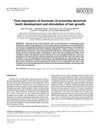 10 citations,
November 2018 in “Nature Biotechnology”
10 citations,
November 2018 in “Nature Biotechnology” Drugmakers are optimistic about targeting the Wnt pathway for new treatments despite past challenges.
 September 2023 in “Nature communications”
September 2023 in “Nature communications” Alk1 in specific cells is crucial for proper nerve branching and hair function.
 September 2017 in “Springer eBooks”
September 2017 in “Springer eBooks” PRP injection therapy shows promise for treating hair loss, increasing hair count and thickness with minimal side effects.
 253 citations,
April 2014 in “Drugs”
253 citations,
April 2014 in “Drugs” Teriflunomide helps reduce multiple sclerosis symptoms and is safe for most patients.
 248 citations,
November 2011 in “The EMBO Journal”
248 citations,
November 2011 in “The EMBO Journal” Wnt1/βcatenin signaling is crucial for heart repair after injury.
 90 citations,
October 1996 in “Dermatologic Clinics”
90 citations,
October 1996 in “Dermatologic Clinics” Growth factors are crucial for hair development and could help treat hair diseases.
 82 citations,
October 2019 in “Frontiers in Immunology”
82 citations,
October 2019 in “Frontiers in Immunology” Changes to the Foxp3 protein affect how well regulatory T cells can control the immune system, which could help treat immune diseases and cancer.
 48 citations,
March 2019 in “Frontiers in Physiology”
48 citations,
March 2019 in “Frontiers in Physiology” Wounds on the face usually heal with scars, but understanding how some wounds heal without scars could lead to better treatments.
 47 citations,
July 2013 in “Pharmacological Reviews”
47 citations,
July 2013 in “Pharmacological Reviews” Regenerative pharmacology, which combines drugs with regenerative medicine, shows promise for repairing damaged body parts and needs more interdisciplinary research.
 45 citations,
January 2020 in “International Journal of Molecular Sciences”
45 citations,
January 2020 in “International Journal of Molecular Sciences” Some natural compounds may help overcome drug resistance in certain cancers, but more research is needed.
 35 citations,
January 2013 in “The Journal of experimental medicine/The journal of experimental medicine”
35 citations,
January 2013 in “The Journal of experimental medicine/The journal of experimental medicine” CD98hc's role in skin health decreases with age.
 34 citations,
December 2009 in “The International Journal of Developmental Biology”
34 citations,
December 2009 in “The International Journal of Developmental Biology” Too much thymosin beta4 causes weird teeth and more hair growth in mice.
 27 citations,
March 2018 in “Biomaterials”
27 citations,
March 2018 in “Biomaterials” Three specific proteins can turn adult skin cells into hair-growing cells, suggesting a new hair loss treatment.
 27 citations,
August 2005 in “The journal of investigative dermatology/Journal of investigative dermatology”
27 citations,
August 2005 in “The journal of investigative dermatology/Journal of investigative dermatology” Researchers found new genes involved in hair growth, which could help develop new hair treatments.
 26 citations,
December 2021 in “Regenerative Biomaterials”
26 citations,
December 2021 in “Regenerative Biomaterials” The hydrogel speeds up skin wound healing and helps regenerate tissue.
 22 citations,
May 2021 in “Nature Communications”
22 citations,
May 2021 in “Nature Communications” Tissue stiffness affects hair follicle regeneration, and Twist1 is a key regulator.
 8 citations,
May 2021 in “Applied Materials Today”
8 citations,
May 2021 in “Applied Materials Today” New nano composite helps reduce scars and regrow hair during burn wound healing.
 8 citations,
October 2020 in “International Journal of Molecular Sciences”
8 citations,
October 2020 in “International Journal of Molecular Sciences” Nonanal from fruits and vegetables promotes hair growth by increasing growth factors.
 6 citations,
February 2022 in “The journal of neuroscience/The Journal of neuroscience”
6 citations,
February 2022 in “The journal of neuroscience/The Journal of neuroscience” Deleting the PTEN gene in mice causes nerve cells to grow larger and heal better after injury, but may cause overgrowth and hair loss in older mice.
 5 citations,
January 2009 in “Dermato-endocrinology”
5 citations,
January 2009 in “Dermato-endocrinology” ADAM 10 and ADAM 12 proteins are involved in different stages of hair growth and could be targets for treating hair disorders.
 3 citations,
June 2017 in “Methods”
3 citations,
June 2017 in “Methods” Researchers created a model to understand heart aging, highlighting the role of microRNAs and identifying key genes and pathways involved.
 2 citations,
January 2013 in “Elsevier eBooks”
2 citations,
January 2013 in “Elsevier eBooks” The document explains the genetic causes and characteristics of inherited hair disorders.
 1 citations,
December 2016
1 citations,
December 2016 Researchers created a model to understand heart aging, highlighting key genes and pathways, and suggesting miR-208a as a potential heart attack biomarker.
 January 2024 in “Regenerative Biomaterials”
January 2024 in “Regenerative Biomaterials” Metal organic frameworks-based scaffolds show promise for tissue repair due to their unique properties.
 April 2021 in “Sohag Medical Journal”
April 2021 in “Sohag Medical Journal” Alopecia areata is an autoimmune condition causing hair loss, linked to genetic factors and immune system issues, with no cure yet.
 January 2013 in “Elsevier eBooks”
January 2013 in “Elsevier eBooks” The conclusion is that understanding how patterns form in biology is crucial for advancing research and medical science.
 October 2007 in “Journal of Investigative Dermatology”
October 2007 in “Journal of Investigative Dermatology” The document suggests a bacteria plays a significant role in acne rosacea and that white hair can regain color after transplant, meriting more research on reversing grey hair.
 October 2003 in “Journal of Investigative Dermatology Symposium Proceedings”
October 2003 in “Journal of Investigative Dermatology Symposium Proceedings” Mice treatments didn't grow hair, a patient treatment may affect immune response, and people with hair loss often feel anxious or depressed.
 222 citations,
October 2014 in “Annual Review of Pharmacology and Toxicology”
222 citations,
October 2014 in “Annual Review of Pharmacology and Toxicology” Eph receptors and ephrins may be promising targets for treating diseases, but more understanding is needed for effective and safe therapies.
 150 citations,
June 2014 in “Biomaterials”
150 citations,
June 2014 in “Biomaterials” Peptide hydrogels heal burn wounds faster and better than standard dressings.






























